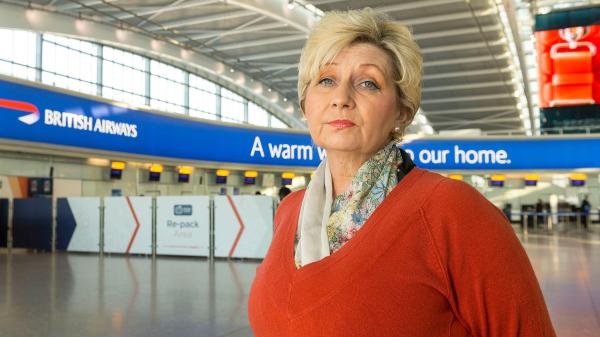A former British Airways flight attendant claims her health collapsed after she was “poisoned” by fumes while working on aircraft, as it emerged that four UK airlines are being sued by 74 cabin crew who say they were exposed to contaminated air.
Trudie Dadd, 56, says she suffered “unbelievable fatigue”, memory and stomach problems, confusion, and numbness in her feet after she was twice exposed in one year to fumes on BA flights.
The former purser, who flew with BA for 20 years, accused airlines of “burying their heads in the sand” and dismissing concerns about the health risks of so-called “fume events”.
Figures leaked to The Sunday Times showed there were at least 292 incidents of fumes or smoke inside aircraft operated by British carriers between June 2014 and May 2015. Illness was reported in 96 cases. The Civil Aviation Authority (CAA), which collects the data, would not comment on the figures.
Sources say there have been a spate of recent events involving BA’s fleet of so-called “super-jumbo” A380 passenger jets. There were 12 fume events on BA A380s in a 30-day period between October and November, according to one source. In one incident, involving a flight between Singapore and Heathrow last month, five cabin crew reported feeling ill, another source claimed.
Nearly all commercial airliners have a system that compresses air from the engines and uses it to pressurise the cabin. If, however, seals inside the engine leak, heated oil fumes can enter the air supply, contaminating it with chemicals that some experts believe can lead to serious health problems and in some cases death.
Campaigners claim cabin crew are most at risk because of the cumulative effect of years of exposure to contaminated air.
Unite, the union, is representing 74 cabin crew, including Dadd, who claim they were made ill by toxic cabin fumes. More than 60 cases involve former BA staff. Virgin Atlantic, easyJet and Jet2 also face personal injury cases. “It is a health issue which the airline industry has been aware of for some time and is so serious that our members are likening it to the impact of asbestos on the building industry,” said Howard Beckett, Unite’s executive director for legal services.
Questions remain over the death in January 2014 of a BA steward, Matthew Bass, 35.
Toxic organophosphates — which are found in substances such as jet engine oil — were discovered in his body, an inquest heard last year.
The inquest will resume in the new year and could shed light on the risks posed by contaminated cabin air.
Dadd, from Sandhurst, Berkshire, claims she was exposed to a strong smell that she described as like bad feet mixed with nail polish remover, while she was preparing drinks in the galley of a BA flight from Madrid to Heathrow in April 2014. She felt ill as she drove home and, after returning to work for a few days, she remained in bed ill for around two weeks.
A year later, in April 2015, she experienced another strong chemical smell and then an exhaust smell as her aircraft came into land at Heathrow from Barcelona. “Over the next few months my health really started to deteriorate badly,” she said. “I couldn’t remember simple things [like] people’s names … I was in a fog — I just wasn’t functioning.”
Dadd, who worked as a flight attendant on Concorde for five years before moving to short-haul flights, underwent tests at a private medical laboratory in London that specialises in “nutritional and environmental medicine”.
A fat biopsy found above average levels of the chemicals toluene, an industrial solvent that can also be found in jet fuel, and trichloroethane, another solvent. Benzene, xylene, dichlorobenzene and chloroform were also present.
Dadd, who used to fly around 80 hours per month, says her GP said she should consider stopping flying and signed her off work.
After a six-month detox regime, Dadd was retested and the toxic chemicals in her body had reduced, except benzene. “If I hadn’t had the tests, I certainly would not have got my health back and I don’t know if I would still be here,” she said.
Dadd claims there are a “significant” number of BA staff grounded at any one time because they are suffering the ill effects of fumes.
Dadd said she reported the two fume events but said BA did not then talk to her about the incidents, something she described as “disgraceful”. She accused BA of refusing to admit there was a problem, adding: “In their eyes it doesn’t happen.”
BA said it would not operate an aircraft “if we believed it posed a health or safety risk to our customers or crew”.
“We always encourage our colleagues to report any potential safety incidents to allow us to investigate them, and all reports are shared with the CAA.” It said there had been “substantial” research into cabin air quality over many years and the studies had “not shown that exposure to potential chemicals in the cabin causes long-term ill health”.
The company would not comment on Dadd’s case but said it always offered “support and advice” if staff were unwell.
Airbus, the aircraft manufacturer, said its aircraft were designed “to provide the highest level of cabin air quality”, while its rival Boeing said “cabin air is safe to breathe”.
Virgin Atlantic said “multiple studies” had found that a link between contaminated cabin air and illnesses was “unlikely”, while Jet2 said it had seen no evidence of a link. Easyjet said its aircraft were “fully compliant” with the latest standards of air quality.
Dadd quit BA in September. “I have had to leave a job that I loved — a job I wanted to do since the age of 10. I am very angry that I have had to take that decision,” she said.

